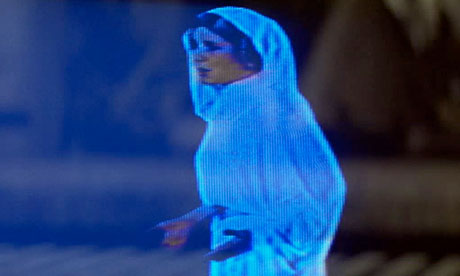At the end of the Prequels we get Yoda explaining to Obi-Wan about how to become a ghost. This scene is amazing and key on so many levels.
YODA
(continuing) Master Kenobi, wait a moment. In your solitude on Tatooine, training I have for you.
OBI-WAN
Training??
YODA
An old friend has learned the path to immortality.
OBI-WAN
Who?
YODA
One who has returned from the netherworld of the Force to train me . . . your old Master, Qui-Gon Jinn.
OBI-WAN
Qui-Gon? But, how could he accomplish this?
YODA
The secret of the Ancient Order of the Whills, he studied. How to commune with him. I will teach you.
OBI-WAN
I will be able to talk with him?
YODA
How to join the Force, he will train you. Your consciousness you will retain, when one with the Force. Even your physical self, perhaps.
But what are they discussing? Yoda is offering immortal
life. Did this movie have anything else to say about immortal life? Oh right,
we just spent the whole movie watching Anakin obsessively chase after Dark Side
immortality, as he destroyed everything he cared about for it. Why would the
Jedi be researching immortality too?
Palpatine sez: The Sith and the Jedi are similar in almost every way,
including their quest for greater power.
So this is a movie where we both get that line, and we see
separate Sith and Jedi methods for attaining immortality. Lucas could have
easily left this scene out (there's no tactical necessity to explain Force
ghosts at this point), but is able to include it in such a way that draws
further equivalencies between these teams.
Third, it returns us to Yoda's character and his reliance on
the "real self". Remember his line of Episode 5 "Luminous beings
we are, not this crude matter." Guys guys, he must be thinking, I've
finally found a way to really be a luminous being! Concerns about the world, or
the effect of our imperfect actions on the world, can go to rot. We can float
off and be star ghosts instead of dealing with messiness and reality and other
perspectives.
And of course he's wrong.
***
What is a ghost?
(Well, a Force ghost, in this universe.)
It's important to note how they are described. In Revenge of
the Sith, Yoda describes them as a way to continue on, to maintaining
themselves. This is not how Obi-Wan
describes or practices it in the Original Trilogy. Then it's a way to continue
to affect the world even after he is gone, a way to help and save people.
Here is what Obi-Wan looks like as a ghost.
Does this look like anything else we had seen in the movies
so far?
Force ghosts look exactly like electronic transmissions in
this universe. They are a way to
communicate with people. Whatever Obi-Wan is (dead, in heaven, etc) this
representation is not him. It is him communicating with Luke.
This is why Han can't see him and rides through his
appearance on Hoth. This is why Obi-Wan only talks to other characters, and
doesn't simply use his transenergy state to fly in and blow up the Death Star
himself. We never see ghost Obi-Wan chilling by himself in deep space. He's not really there. We
are simply seeing a visual representation of his communication with Luke, which
is all a Force ghost can do.
But if the Force is the connection of all believers, then
even after death we can influence the world. In fact our ability to influence
others – others who trust us – is all that the Force is.
And as we are told, that – and not hanging on forever – is more
powerful than you can imagine.


No comments:
Post a Comment